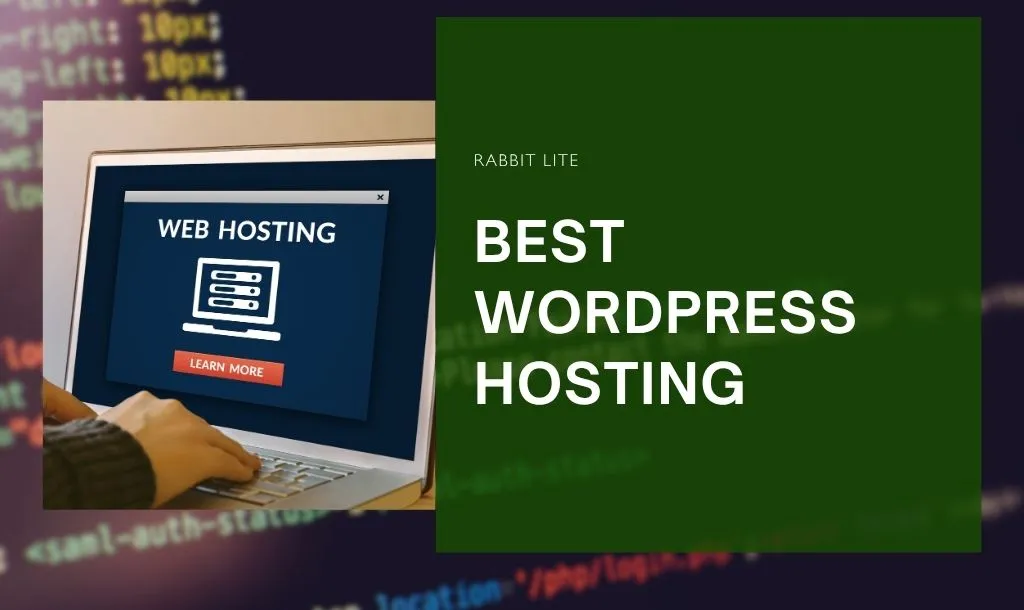- 1. Why Your Choice of WordPress Hosting Matters
- 1.1. Site speed & user experience
- 1.2. Uptime, reliability, and avoiding downtime
- 1.3. Security, backups, and built-in protection
- 1.4. Scalability — handling traffic spikes
- 1.5. How a fast host complements a lightweight theme like Rabbit Lite
- 2. Key Criteria to Evaluate the Best WordPress Hosting
- 2.1. Performance Metrics: Server Response, PHP Version, Caching
- 2.2. Resource Limits: CPU, Memory, I/O, Concurrent Processes
- 2.3. Support & Management Features: Auto Updates, Staging, Backups
- 2.4. Security Features: Malware Scanning, Firewall, SSL, Isolation
- 2.5. Price & Renewal Costs, Location of Data Centers
- 3. Types of WordPress Hosting
- 3.1. Shared vs Managed WordPress Hosting
- 3.2. VPS, Cloud, Dedicated & Headless Options
- 3.3. Features in WordPress-optimized Hosting
- 4. Best WordPress Hosting Providers
- 4.1. Kinsta
- 4.2. WP Engine
- 4.3. SiteGround
- 4.4. Hostinger
- 4.5. Bluehost
- 4.6. DreamHost
- 4.7. Other Reliable Options
- 5. How to Test & Compare Hosts
- 6. Frequently Asked Questions (FAQ)
- 6.1. What is “managed WordPress hosting” and is it worth it?
- 6.2. Should I pick a host geographically near my visitors?
- 6.3. How often should I upgrade or switch host?
- 6.4. Does free SSL or domain inclusion matter much?
- 7. Conclusion
You’re frustrated: your WordPress site is slow, sometimes inaccessible, or you don’t know which hosting to trust. You’ve searched “best WordPress hosting” dozens of times and found conflicting advice.
In this guide, you’ll learn step by step how to choose a host that fits your needs — performance, support, scalability — and understand trade-offs. If you read this whole article, you’ll know exactly which host you should pick today.
Why Your Choice of WordPress Hosting Matters
Choosing the best WordPress hosting isn’t just a technical decision — it directly impacts your site’s success. The right host improves speed, boosts SEO rankings, and keeps your website online when traffic spikes. On the other hand, poor hosting can slow down your pages, cause downtime, and hurt user experience.
Site speed & user experience
Your hosting provider directly shapes how fast your website feels. A high-performance server delivers pages quickly, reducing bounce rates and keeping users engaged. Speed also plays a major role in SEO rankings and conversion rates.
Even if your WordPress theme and plugins are optimized, a weak server can drag performance down. Visitors won’t wait more than a few seconds — poor hosting often means lost traffic and sales.
Uptime, reliability, and avoiding downtime
Your site’s uptime determines how consistently it’s available to visitors. Even short outages can disrupt business operations, reduce trust, and negatively impact your search visibility.
Look for hosting services that guarantee at least 99.9% uptime and use server redundancy to avoid single points of failure. These systems automatically reroute traffic when one data center goes offline.
Reliable uptime means your site is always accessible, no matter when your audience visits — it’s the foundation of professionalism and credibility.
Security, backups, and built-in protection
Security is a must, not an option. The best WordPress hosting should include firewalls, malware scanning, and DDoS protection by default. These safeguard your files and database without needing constant plugin management.
Automatic backups are equally essential — whether daily or in real time, they ensure you can quickly recover from hacking, update failures, or accidental data loss.
Scalability — handling traffic spikes
A scalable hosting environment ensures your site stays stable during sudden traffic surges. When you go viral or run a big promotion, your server should automatically allocate more resources to handle the load.
Cloud and managed WordPress plans are especially designed for this flexibility. They prevent downtime while maintaining top performance under pressure.
Scalability guarantees growth — your hosting should evolve with your website, not hold it back.
How a fast host complements a lightweight theme like Rabbit Lite
Even the fastest host can’t fix a bloated theme. That’s why pairing a lightweight theme with a fast WordPress host is crucial for optimal performance. Rabbit Lite is built to load instantly and minimize server requests.
It’s optimized for caching, compressed scripts, and minimal render-blocking — features that take full advantage of modern hosting infrastructure.
Key Criteria to Evaluate the Best WordPress Hosting
Choosing the best WordPress hosting isn’t just about price — it’s about finding the perfect balance between performance, reliability, and long-term value. Whether you’re running a small blog or managing multiple client sites, understanding these key factors will help you make an informed decision.
In this section, we’ll break down the most important metrics that define a fast and reliable WordPress hosting environment. From server performance and security to backup systems and renewal costs, these criteria will guide your WordPress hosting comparison and help you decide whether you need managed WordPress hosting or a simpler shared plan.
Performance Metrics: Server Response, PHP Version, Caching
Performance defines the user’s first impression. Look for hosting with low TTFB (under 200ms), updated PHP versions (8.1+), and server-level caching such as LiteSpeed, NGINX FastCGI, or Varnish for faster delivery.
A server’s configuration affects how quickly your site responds to visitors. Even optimized themes like Rabbit Lite rely on your host’s ability to process PHP and database queries efficiently.
Resource Limits: CPU, Memory, I/O, Concurrent Processes
Every host allocates certain resources per account. Cheap plans often cap CPU, memory, and I/O usage, causing random slowdowns when your traffic increases or background tasks run simultaneously.
When these limits are exceeded, WordPress might show “Resource Limit Is Reached” or even crash temporarily. This makes uptime and consistency unpredictable.
Support & Management Features: Auto Updates, Staging, Backups
Reliable support saves time and prevents frustration. Managed WordPress hosting usually includes automatic updates, scheduled backups, and one-click staging — ideal for non-technical users.
Shared hosting may require manual setup for these tasks, which can be risky during updates or migrations. Managed plans handle this seamlessly, ensuring stability and security.
Security Features: Malware Scanning, Firewall, SSL, Isolation
Security should never be optional. A trustworthy WordPress host isolates your account, provides a free SSL certificate, and performs daily malware scans to prevent infections.
Server-level firewalls and intrusion detection can block attacks before they reach your site. This is especially crucial for business or eCommerce WordPress websites.
Price & Renewal Costs, Location of Data Centers
Hosting prices can be deceptive — many start cheap but double or triple at renewal. Always review the long-term cost before committing to a multi-year plan.
Performance also depends on proximity. Choosing a host with servers near your target audience lowers latency and improves load times significantly.
Types of WordPress Hosting
Understanding the different types of hosting is crucial when searching for the best WordPress hosting. Each option—shared, managed, VPS, or cloud—offers unique benefits, costs, and performance trade-offs.
Shared vs Managed WordPress Hosting
Shared hosting means your site lives on a server with hundreds of others. It’s cheaper but slower and less secure. Managed WordPress hosting costs more, but it handles updates, caching, and backups automatically.
VPS, Cloud, Dedicated & Headless Options
VPS and Cloud hosting give you more control and scalability. Dedicated servers are powerful but costly, suited for enterprise needs. Headless setups use WordPress as a backend only — ideal for developers building web apps or static frontends.
Features in WordPress-optimized Hosting
WordPress-optimized hosting often includes:
- Server-level caching (LiteSpeed / NGINX)
- Object caching (Redis / Memcached)
- Integrated CDN
- One-click staging and backup tools
Rabbit Lite Theme is fully compatible with these environments, automatically detecting SSL, caching, and CDN integration for faster performance.
Best WordPress Hosting Providers
Choosing the best WordPress hosting provider depends on your site’s size, budget, and performance needs. Below, we compare top hosts with real-world use cases to help you decide confidently.
Kinsta
Premium managed WordPress hosting built on Google Cloud.
Strengths: Global CDN, staging, automatic backups, and outstanding performance.
Best for: Businesses, high-traffic blogs, and those who want zero maintenance.
WP Engine
Known for reliability and developer-friendly tools.
Strengths: Automated security, caching, and integrated Git + staging.
Best for: Agencies, developers, or growing content sites that need strong support.
SiteGround
A balance between affordability and features.
Strengths: Fast servers, strong customer service, and built-in optimization.
Best for: Bloggers or small business owners looking for managed simplicity.
Hostinger
Affordable hosting with LiteSpeed technology.
Strengths: Free SSL, CDN, and strong performance for the price.
Best for: New sites, portfolios, and users with limited budgets.
Bluehost
Officially recommended by WordPress.org.
Strengths: Simple onboarding, automatic installation, and free domain.
Best for: Beginners who want an all-in-one setup experience.
DreamHost
Transparent pricing and strong uptime record.
Strengths: Free privacy protection, no bandwidth caps, and predictable renewals.
Best for: Users who value honesty and consistency.
Other Reliable Options
- A2 Hosting: Known for speed and developer tools.
- Cloudways: Cloud-based flexibility, pay-as-you-go pricing.
- NameHero: Balanced features with strong performance.
How to Test & Compare Hosts
Before paying for a long-term plan, take time to test your top choices:
- Use staging or trial periods to measure speed.
- Monitor metrics like load time, TTFB, and database response.
- Test support responsiveness through chat or ticket systems.
- Run migration tests to ensure compatibility.
- Review uptime logs and real customer feedback.
Don’t rely solely on “review sites” — many are affiliate-driven. Always run your own benchmark before deciding.
Frequently Asked Questions (FAQ)
This section answers the most frequently asked questions about WordPress hosting, helping you clarify technical doubts, understand hosting features, and make smarter choices before committing to a long-term plan.
What is “managed WordPress hosting” and is it worth it?
Managed WordPress hosting is a premium type of hosting optimized specifically for WordPress sites. It includes automatic updates, daily backups, security monitoring, and performance optimization without requiring technical skills. Yes — it’s worth it if you value speed, security, and reliability. Unlike shared hosting, managed WordPress hosting gives you peace of mind by handling caching, database optimization, and malware protection, allowing you to focus on growing your site instead of maintaining servers.
Should I pick a host geographically near my visitors?
Yes, location plays a big role in performance. Choosing a WordPress hosting provider with servers near your main audience reduces latency and improves page load speed. For example, if most of your readers are in Asia, hosting your site on a Singapore or Tokyo data center can make a noticeable difference. If your traffic is global, pair your host with a CDN like Cloudflare to distribute your content worldwide efficiently — one of the keys to achieving the best WordPress hosting performance.
How often should I upgrade or switch host?
It’s good practice to review your WordPress hosting performance every 6–12 months. If your uptime drops below 99.9% or your average load time exceeds 2 seconds, consider upgrading to a more powerful plan or switching to a managed WordPress hosting provider. Regular reviews ensure your website keeps up with growing traffic and new PHP versions. Don’t wait until your site slows down — proactive upgrades help maintain SEO rankings and user satisfaction.
Does free SSL or domain inclusion matter much?
Free SSL and domain inclusion are nice bonuses when evaluating the best WordPress hosting, but they shouldn’t be your deciding factor. While SSL is essential for site security and SEO, many hosts now provide it for free. What truly matters is long-term reliability — fast server performance, solid uptime, and strong customer support. Prioritize hosts with proven infrastructure, transparent pricing, and security tools over short-term incentives like free domains or promo offers.
Conclusion
Choosing the best WordPress hosting isn’t about picking the most expensive option — it’s about finding the right fit for your goals, traffic, and technical comfort.
Start small if you’re new, upgrade when you grow, and always test before you commit.
Pair a reliable host with a fast, lightweight theme like Rabbit Lite. You’ll get top-tier performance, SEO benefits, and an effortless editing experience — the perfect foundation for any WordPress website.




